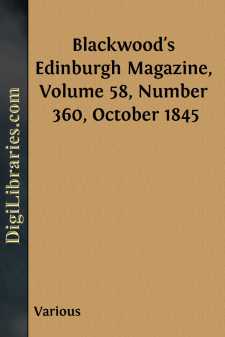Categories
- Antiques & Collectibles 13
- Architecture 36
- Art 48
- Bibles 22
- Biography & Autobiography 813
- Body, Mind & Spirit 142
- Business & Economics 28
- Children's Books 17
- Children's Fiction 14
- Computers 4
- Cooking 94
- Crafts & Hobbies 4
- Drama 346
- Education 46
- Family & Relationships 57
- Fiction 11829
- Games 19
- Gardening 17
- Health & Fitness 34
- History 1377
- House & Home 1
- Humor 147
- Juvenile Fiction 1873
- Juvenile Nonfiction 202
- Language Arts & Disciplines 88
- Law 16
- Literary Collections 686
- Literary Criticism 179
- Mathematics 13
- Medical 41
- Music 40
- Nature 179
- Non-Classifiable 1768
- Performing Arts 7
- Periodicals 1453
- Philosophy 64
- Photography 2
- Poetry 896
- Political Science 203
- Psychology 42
- Reference 154
- Religion 513
- Science 126
- Self-Help 84
- Social Science 81
- Sports & Recreation 34
- Study Aids 3
- Technology & Engineering 59
- Transportation 23
- Travel 463
- True Crime 29
Blackwood's Edinburgh Magazine, Volume 58, Number 360, October 1845
by: Various
Description:
Excerpt
MONTESQUIEU.
Montesquieu is beyond all doubt the founder of the philosophy of history. In many of its most important branches, he has carried it to a degree of perfection which has never since been surpassed. He first looked on human affairs with the eye of philosophic observation; he first sought to discover the lasting causes which influence the fate of mankind; he first traced the general laws which in every age determine the rise or decline of nations. Some of his conclusions were hasty; many of his analogies fanciful; but he first turned the human mind in that direction. It is by repeatedly deviating into error that it can alone be discovered where truth really lies: there is an alchemy in the moral, not less than in the material world, in which a vast amount of genius must be lost before it is discovered that it has taken the wrong direction. But in Montesquieu, besides such occasional and unavoidable aberrations, there is an invaluable treasure of profound views and original thought—of luminous observation and deep reflection—of philosophic observation and just generalization. His fame has been long established; it has become European; his sayings are quoted and repeated from one end of the world to the other; but to the greater part of English readers, his greatness is known rather from the distant echo of continental fame, than from any practical acquaintance with the writings from which it has arisen.
Though Montesquieu, however, is the father of the philosophy of history, it is due to Tacitus and Machiavel to say, that he is not the author of political thought. In the first of these writers is to be found the most profound observations on the working of the human mind, whether in individuals or bodies of men, that ever were formed by human sagacity: in the latter, a series of remarks on Roman history, and the corresponding events in the republics of modern Italy, which, in point of deep political wisdom and penetration, never were surpassed. Lord Bacon, too, had in his Essays put forth may maxims of political truth, with that profound sagacity and unerring wisdom by which his thoughts were so preeminently distinguished. But still these men, great as they were, and much as they added to the materials of the philosophy of history, can hardly be said to have mastered that philosophy itself. It was not their object to do so; it did not belong to the age in which they lived to make any such attempt. They gave incomparable observations upon detached points in human annals, but they did not take a general view of their tendency. They did not consider whence the world had come, or whither it was going. They formed no connected system in regard to the march of human events. They saw clearly the effects of particular measures or systems of government at the time, but they did not reflect on the chain of causes which first raised up, and afterwards undermined it. Aristotle, the most powerful intellect of the ancient world, was of the same calibre as a political observer....












